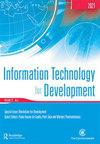Explaining the digital divide in the European Union: the complementary role of information security concerns in the social process of internet appropriation
IF 5.1
3区 管理学
Q1 DEVELOPMENT STUDIES
引用次数: 1
Abstract
ABSTRACT Most theoretical and empirical explanations of the generation of digital divides have been integrated into the resources and appropriation theory, which proposes a sequential model reflecting a socially unequally distributed digital divide. The unequal social distribution is reflected in internet use that is sequentially influenced by motivations/attitudes, physical access, and digital skills. We extend the sequential model by exploring the complementary role of information security concerns in producing the digital divide. Using a predictive approach, we tested a comprehensive partial least squares-structural equation model with data from a European Union survey, finding that information security concern is another significant determiner of the digital divide. Heterogeneity in social internet appropriation can be summarized in social mechanisms explained by education and age among well-educated Europeans, and by country digital development among less well-educated Europeans. We conclude with a discussion of theoretical and policy implications of our findings.解释欧盟的数字鸿沟:信息安全问题在互联网占用的社会过程中的补充作用
本文章由计算机程序翻译,如有差异,请以英文原文为准。
求助全文
约1分钟内获得全文
求助全文
来源期刊

Information Technology for Development
Multiple-
CiteScore
11.30
自引率
16.70%
发文量
34
期刊介绍:
Information Technology for Development , with an established record for publishing quality research and influencing practice, is the first journal to have explicitly addressed global information technology issues and opportunities. It publishes social and technical research on the effects of Information Technology (IT) on economic, social and human development. The objective of the Journal is to provide a forum for policy-makers, practitioners, and academics to discuss strategies and best practices, tools and techniques for ascertaining the effects of IT infrastructures in government, civil societies and the private sector, and theories and frameworks that explain the effects of IT on development. The concept of development relates to social, economic and human outcomes from the implementation of Information and Communication Technology (ICT) tools, technologies, and infrastructures. In addition to being a valuable publication in the field of information systems, Information Technology for Development is also cited in fields such as public administration, economics, and international development and business, and has a particularly large readership in international agencies connected to the Commonwealth Secretariat, United Nations, and World Bank.
 求助内容:
求助内容: 应助结果提醒方式:
应助结果提醒方式:


